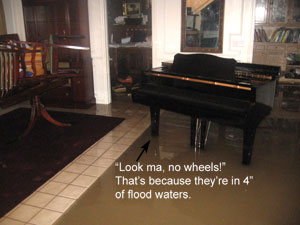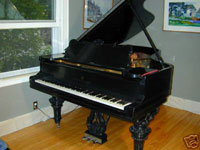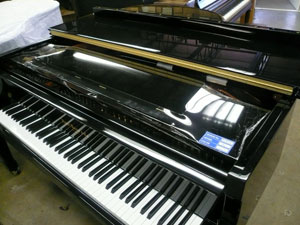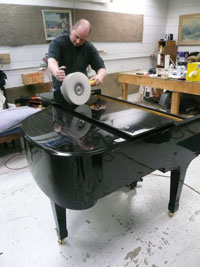|
Buying a Piano? Please click here for links to our piano inventories: Please call 630.584.5000 for current, best pricing and availability in your area.
Selling A Piano? Renting A Piano?
Servicing a Piano? About Cordogan's Exclusively from Cordogan's Downloadable Player Piano Song Library Customer Software Upgrades
|
Buying a piano is exciting! The piano is capable of being one of the most important purchases a family can make. It can be a gateway to the arts, a vehicle for educational and mental discipline, a central focal point for family activity, a canvas for creativity and fuel for the soul. Whether you're shopping online or at our giant retail showroom, Cordogan's goal with every customer is to make the purchasing experience a pleasant and rewarding one.
Most people reaching this page have never bought a piano before, so this page is set up to give people the palette of knowledge to make an informed buying decision. Our site will also help you recognize and avoid some of the "sounds-too-good-to-be-true" advertising claims and other sales-related mischief employed by retailers, online resellers and even piano technicians. If you can't find (or don't want to have to find) a local dealer who has the product or the professional guidance you seek, it might be time to call Cordogan's! Please feel free to call us at 630.584.5000 or email us!  "Buy today and we'll throw in the black keys for FREE!" |
||
|
|||
|
|
|||
|
The dangers that lurk with Ebay and Craigslist "deals" In an effort to help consumers understand the pros and cons of online classifieds / auctions, we have created this Buying Tip. While it is possible to get a great deal on buying items from these sites, when it comes to pianos, the risk is raised considerably because people generally don't know pianos like they know the rare book, halloween costume or vintage clothing item they're seeking on ebay or craigslist. Even when a piano buyer does know which piano brand & model they seek, the biggest driving force of a piano's value is its condition -- not the brand, the model and not the age, making comparative shopping so much more challenging since "condition" is so subjective. One of the biggest problems that we see online buyers face is that the instrument of their dreams happens to be in a land far, far way, where they can't easily see the piano. On paper (or rather "onscreen") it seems to be a great deal but since it's so far away, the consumer tries to find a similar deal locally. When they can't find a similar deal locally, they either get discouraged and don't buy, OR worse yet they buy sight unseen from a long distance source and are treated to an unpleasant surprise when the piano is delivered in shoddy condition. CLICK ON IMAGE BELOW TO ENLARGE
FLOOD & HURRICANE PIANOS -- This is by far the biggest problem plaguing online buyers today, and it has likely never even crossed your radar because you have never seen an online ad stating "this piano was in Hurricane Katrina" or "this piano came out of the flood waters of Cedar Rapids, IA" -- and you never will. There are THOUSANDS of pianos that are ruined every year in natural disasters and many resurface online. These pianos get turned in to insurance companies, and because pianos just can't be placed on the curbside for the garbage man, they get picked up by dealers and technicians, some of whom get creative with restoration efforts, even though these pianos are supposed to be destroyed. A grand piano can be in up to TWO FEET of flood waters before the actual instrument gets wet. Obviously the pianos get saturated with humidity (and odor) which cause countless short term and long term problems, but with a new set of legs and a pedal lyre, these pianos look every bit as good in pictures as a piano that never went for a swim. Floods don't descriminate either -- Steinways, Yamahas, Kawais, Baldwins, Mason & Hamlins, Bosendorfers -- no brand is immune from being in a flood or a hurricane. MYTHICAL PIANOS - This is no joke. We're actually talking about ebay and craigslist ads offering pianos that don't exist. The sellers simply take your money and you never receive a piano. Not surprisingly, these are the best priced piano ads on the internet so they can catch your attention quickly. Another unfortunate outcome from these ads is when piano shoppers don't actually inquire about these pianos but instead assume they're legitimate offers, using the fictitious (and amazing) prices as benchmarks to begin their local shopping efforts. The authors of scam ads get very creative in their descriptions, offering a compelling deal so it's very difficult to know which ads are scams without actually attempting to purchase one of the pianos. The most frequently found scam ads are ones for popular piano models -- Yamaha mostly -- and to a lesser extent Steinway. There will be pictures and creative hardship scenarios like this one that explain the miraculous deal at hand (which is an actual Craigslist ad for a $2500 Yamaha C3 grand piano. We are posting it so that people can find this site by Googling some of the text in this popular ad, but be advised, the ads are always evolving and getting more appealing: Thanks for getting back with me,
Right now we are in Helena, MT because my husband was moved here with the job and we already found an apartment here. The piano is here in at the shipping company sealed and ready to ship it. The delivery process is payed by us and we want to finish this deal through Google Checkout because they are a big company and we can both be protected and insured. You will receive the instrument in 1-2 days and you will get the chance to inspect it 3 days, play it and everything you want. During that 3 days testing period I will not be getting any money.
If by any reason the piano is not as described or if you find any problems with it, I will arrange to ship it back on my cost. Google will hold the funds until the inspection period is over and you decide if you're going to buy it or not. This way you're not going to pay for something you haven't seen and with the inspection period you can make sure it's as described.
If you're interested to purchase just email me with your full name,shipping address and your phone number,so I can notify Google that you are selected as my buyer and they will contact you to explain the entire procedure.
Best Regards,
Caroline & Mike Hlebert
PS: I attached the pics.
More on ads like this one can be found here.
There's also a well known brokerage site that isn't monitored well, so anyone can claim to have a piano for sale and work an unsuspecting consumer into parting with a partial payment -- or worse yet, payment in full without ever having to ship a piano. There are countless other items and issues that can dramatically affect that resale value of pianos that are otherwise identical on paper. We can't begin chronicling all the internal issues that can plague used pianos in a manner that won't show up in pictures. We simply wish to share a few buying caveats with you to give you an idea of why it is important to buy from a reputable source -- and not one who simply claims to be a reputable source. |
|||
|
1) Origin. Who is actually honoring the warranty? What happens if they're gone or change business names? 2) Content. What is REALLY covered? If you buy a new piano, your piano SHOULD come with a new warranty from the manufacturer. On inexpensive stencil pianos (brand names you've never heard of), some dealers can actually choose to forego the manufacturer's warranty in the name of buying the pianos for less from the manufacturer. In that case, it means the "10 year"...or "Lifetime"...or "Infinity and Beyond" warranty you're being offered isn't even from the manufacturer, as you would likely assume. It's from the dealer, and the dealers who use these tactics to sell pianos, are hardly the type interested in customer service.In the event your new piano does come with a manufacturers warranty, YOUR dealer where you purchased it SHOULD facilitate any warranty issues, but many dealers completely wash their hands of service, and turn over your complete servicing needs (warranty or otherwise) to independent contractors, presenting a less than ideal situation.* If you have to bend an ear about your piano's performance problems, it should be the ear of the person who sold you the piano, not the poor tech who is trying (sometimes in vain) to help and may not even be qualified / authorized to do so. To determine how warranty issues are processed by the dealer, look around the store BEFORE you buy. Do you see a repair shop where extensive work is done by the dealer? If they don't have a shop, who does their work? Yes, it's true that the majority of warranty work is done in the home, but not always. Plus, a repair shop helps separate those who just sell pianos from those who are in the piano business. Ideally, your service needs and ongoing communication should always be with and through the dealer. Pick a good one! Is the warranty FULL or LIMITED? There are legal differences between the two, one of which is the issue of transferability. Full warranties, which only a couple major manufacturers offer, are transferable to subsequent owners during the warranty period (imagine what THAT will do for your resale value!) Suffice it to say that full warranties protect the consumer. Limited warranties protect the manufacturers. Many manufacturers don't necessarily bother to put the word "limited" in writing (on their websites, for instance), but be assured that those few manufacturers who are generous to offer a full warranty proudly disclose that fact. "This piano has a 25-year warranty"..." This piano has a LIFETIME warranty"... or other salesperson claims, don't mean much. When you see the fine print, it means parts are covered for 25 years, but labor is for a much shorter period -- and it's a limited warranty. Parts are rarely the issue with warranty work, and that also assumes the same company is still around, under the same ownership. In today's corporate environment, the odds are against the buyer that that will occur. Case in point: in 2002, Baldwin filed for bankruptcy, and the company who bought it indicated they are not required to honor warranties of past products. Not good business! There really isn't any way to protect yourself against such a possibility, other than to choose a full service dealer who is likely going to be sympathetic to your plight in the event you need help with your piano following the manufacturer's curtain call. The "LIFETIME" claim only protects you from things like your iron frame from cracking. You shouldn't worry much about your iron frame cracking unless you like to drop your piano out of high-rise windows. Iron frame cracks are very rare, and the few (this writer has only witnessed or heard of three in tens of thousands) that exist are often due to a frightening moving mishap, in which case a warranty claim would hardly be honored. The general rule of thumb is, the longer the manufacturer's warranty, the MORE inferior the piano. It sounds strange, but some of the finest pianos in the world only have a 5 year full warranty. One great company has a ten year full warranty, then lesser quality instruments tend to get into really long warranties but are so "limited" that they don't cover nearly as much as the premium brands' shorter warranties. If you buy a used piano, the origin of your piano warranty is likely coming from the dealer. This is because VERY few manufacturers have warranties that are transferrable within the warranty period. The fact that your used piano warranty is likely coming from the dealer could be a good thing or a very bad thing, depending on the dealer and their reputation. So if it's a dealer's warranty, you should find out how long they have been in business. Also, how long have they been in business under their current incarnation/name? Did they maintain their past warranties when they changed names? Again, does the dealer have a shop (one that you can physically see, not a mythical one)? How many in-house technicians do they employ? Do they move pianos themselves or do they contract their moves? How motivated do you think this dealer will be to repair things that can't be repaired in the home if they don't have their own technicians, shop and movers? You don't want the smell of lacquer or epoxy lingering in your home! You may also find that more reputable retailers have shorter warranties than fly-by-night outfits. A 1-5 year warranty is common among dealers who wish for their warranties to be generous in terms of inclusiveness. So, if you buy a used piano for $995 with a "twelve year" warranty and your bridge cracks in 2013 so badly that it can't be tuned or played, think hard about what your odds are of that dealer coming to the rescue for a several hundred dollar repair, plus the cost of two moves and retuning in the home! Another word to the wise: dealers often advertise lengthy warranties worded and placed suspiciously close to desirable brand names for which they are NOT authorized dealers. The reality is that these days if a piano store isn't a Kawai, Steinway or Yamaha authorized dealer, it's difficult to get store traffic. *Cordogan's recognizes that many independent contractors are highly skilled and respected members of the technical community. Cordogan's also recognizes that dealers rarely employ such quality technicians to perform the first free tuning (and subsequent work) since technicians are justifiably more expensive than less experienced tuners. |
|||
|
When a professional violinist goes to buy her instrument, you won't see her playing one in the store, then saying, "It's perfect! ...Lemme have the one in a box up there on the shelf." A pro will always insist on buying the instrument she tries out. Pianos aren't ANY different. They are acoustic instruments that are all distinct -- even if there are two of the identical model at hand. Furthermore, like other string instruments such as violins & guitars, pianos arrive from the manufacturer in an "untouched" condition and are capable of becoming MUCH better after a dealer gives it a thorough regulation, cabinet buffing, hammer voicing and tuning. Such work on a piano takes several hours...and sometimes days -- even on a BRAND NEW piano.
If we were four-walls-in-a-strip-mall, we wouldn’t be able to spin a buffing wheel to get all the packaging marks off a piano and make the piano shine as much as it can. It takes a buffing room (see left) to keep the pummus (white chalky substance that gets applied to the buffing wheel) from getting all over everything in the store.Any person who works on violins will tell you that they can spend many, many hours on a new instrument preparing the bridge, tuning pins, strings, adjusting the neck, sound post and so forth. And that's just for the setup of a violin, which contains only a couple dozen parts and 4 strings! By contrast, pianos have 12,000 parts -- 10,000 of which are moving parts -- parts which are required to move within 1/1000ths of an inch...silently, without any squeaks or rattles...for decades! Did we mention that the vast majority of new pianos sold in America are shipped on their sides, halfway around the world? Or that some new lower-end pianos arriving from China and Indonesia place the whole burden on the dealer to make them even PLAYABLE, let alone worthy of an advanced player's talents? Under no circumstances should you EVER buy a new piano where it is uncrated on your front lawn or in your living room like it's a refrigerator. In fact, it's widely considered unconscionable for dealers to sell like that, yet there are a couple that do, who are hoping you look at this purchase like a refrigerator so THEY can save (not so they can save YOU) a bunch of money. Manufacturers cringe at the thought of one of their dealers selling "out of the box" but there's no law against it. Among other problems with such a practice, it introduces sticky warranty issues when something goes wrong and the manufacturer is reluctant to pay in-home warranty fees for something the dealer neglected to fix prior to delivery. When a dealer unboxes the piano at your home, they've never seen it. You've never seen it. With a dealer like this, customer satisfaction is jeopardized on many levels, especially when the customer believes his/her piano will sound and play like the one they saw in the showroom that was fully prepped! This sales tactic saves the DEALER a bunch of money, not YOU and in the end you get a drastically inferior piano to what you naturally thought you were getting. So it may not be immediately apparent if you're not a musician, but take it from us, the LAST thing you want is to buy a piano "right out of the box!" So what EXACTLY is supposed to be done to a new piano before delivery?With all that goes on inside of a piano, it's no wonder that used AND new pianos need extensive servicing BEFORE coming to your home. There are things that should be done to a new piano that simply CAN'T be done in your home. Take for instance, this brand-new, out-of-the-box baby grand. This is how the pianos come to a dealer from the factory -- covered in shrink wrap. When it gets peeled off, there is a film -- not to mention errant little blemishes -- on the finish that only professional buffing with a buffing wheel can fix. So that beautiful, buffed, shiny piano you saw in the showroom ain't what you're getting if the movers are uncrating it in your living room! Without the bright lights of a shop or showroom, there are defects you may not notice until it's WAY too late! Sometimes the inspection process will reveal an irreparable defect prompting us to send the piano back to the manufacturer. In this picture, you'll see a new Chinese-made grand with a cracked plate. Now we're not picking on Chinese-made pianos here -- it really could've been any manufacturer's piano. The point is that we found a defect that CANNOT be fixed, and it's one that would not have been discovered had the lid not been off of the piano for buffing, allowing our technician to fully inspect the plate. This is one of many reasons why dealers must fully inspect new pianos before delivering them. For more on cracked plates, click here. Then there's the regulation of the 9000 or so moving parts in the piano action alone. What is a "piano action," you ask?" Every time you press a key on a piano, you set in motion ~100 intricate little parts, designed to move silently and perfectly for the life of your piano. Those parts need adjusting to specifications that are specific to THAT model from THAT manufacturer. Depending where your piano was made, this procedure could take a couple hours...or a couple of days, so you can dismiss the lip service you get from the dealer who says "Oh yeah, the tuner will come out and do the regulation", unless you want a house guest! (Remember that "regulation" is different than "tuning," which CAN be done in the home-- see below) Require that they regulate your piano in THEIR shop -- assuming they HAVE a shop, of course -- not in your home. Hammer voicing is much different than piano tuning. Voicing is the art of shaping and adjusting the hammers so that the tone (not pitch -- see below) of each key is consistent with every other key on the piano. Pianos, especially lower-end ones, come in needing A LOT of voicing. They're usually too bright because the hammers are so hard, or there are simply a few notes that really jump out when played. With new pianos that are uncrated and placed on Cordogan's sales floor, we "voice out" any glaring notes and perform additional voicing as needed. Your hardwood floors, or tile, or carpet, or high ceilings, all have an effect on how the piano will sound in your room. A thorough salesperson will ask about the piano's environment and/or the type of player at hand in order to instruct skilled technicians on how to voice your piano. Finally, there's tuning. Tuning is the art of raising or lowering the tension of the strings to produce the desired pitch. It's a very sophisticated and scientific art which takes years and years to learn. Unfortunately, just because someone has a lot of experience tuning, it does not mean they're a good tuner, let alone a good technician, who is capable of performing a wide range of services such as regulation, voicing and troubleshooting. A piano should be tuned by the dealer BEFORE it leaves the dealer. That way, when you receive your piano, it's actually playable! Moving the piano to your home will not take a piano out of tune to any great (read noticeable to most) degree. The climate adjustment will gradually affect your piano's tuning, and that process takes a few weeks. It is recommended that a piano be tuned several weeks after a move, allowing it to settle in. In other words, let the piano slip out of tune for 4-6 weeks and THEN tune it, so you can avoid an unnecessary second tuning. For more on piano maintenance, click here. |
|||
|
Have you ever "Googled" someone? Yourself, your own business? The Web dishes out the good and the bad on just about everything and everyone if you know how to find it. Before you buy a piano, consider "Googling" the dealer you're considering. Just go to Google, type in the name of the dealer (be specific and watch the spelling!) and use quotation marks to begin and end the word(s) for which you are searching -- i.e. "Bob's Crazy World of Pianos." Capitalization of the words isn't important-- spelling is. It's not often that the web will return results that praise a dealer. The results are more likely to enlighten you to complaints and other undesirable attributes of some dealers. Beyond this, another good way to research your local dealers is to contact local piano technicians who are registered with the Piano Technicians Guild. Where you buy can be more important than what you buy, so it's worth a couple of phone calls! |
|||
|
When evaluating pianos, you should observe the flooring in the showroom and consider how it might affect the sound of the pianos you're playing. Hardwood floors offer a tremendous sonic advantage that is represented in this video. Wood is used to amplify sound in musical instruments such as the piano. Critical components of a piano's tone such as the soundboard and bridges are made of wood for this very reason. |
|||
|
It may seem like a piano store commandment -- Keep Thy Pianos in Tune. But you'll be surprised to find that many piano stores don't make much of an effort to tune their inventory. It can help a company save thousands of dollars -- even tens of thousands annually to leave pianos untuned on the showroom floor. We often hear customers say "I went to XYZ piano store and nothing was in tune". Unfortunately, some piano stores would rather cater to the larger piece of the pie than cater to the discerning buyer, let alone a discerning buyer with a good ear! |
|||
|
Piano buyers will often seek the assistance of a confidant to help them with their purchase. Sometimes it’s their piano tuner, their piano teacher or maybe a performer they happen to know. Sometimes the confidant’s interests are true. This article is NOT about those fine folks. It’s about the supposed “expert” who shops around for their own best “deal” – not the best deal for the client. Referral fees to piano tuners, piano teachers and others can certainly taint the “recommended” piano. Unfortunately, this happens quite often – and this is nothing new. Decades ago, Reader’s Digest published an article called “The Gentle Racketeers” which exposed the phenomenon of referral fee-driven piano instructors to an unsuspecting America. Here are two real stories that occurred here in Chicago which exemplify how pervasive the problem is: 1) A VERY prominent piano instructor from a VERY prominent music institution in Chicagoland came into our store to review a new grand piano for one of her students. The teacher had been recommending brand X and ONLY brand X to her clients, and we knew this. But this customer wanted to buy a brand Y from us. With such a specific (and only) brand recommendation, we suspected she was on someone’s “payroll” but we couldn’t be sure -- until she entered our store. No more than ten feet inside our store, her first words were, “I just want to let you know that I will not even TOUCH a piano in your store unless you give me 10%”. Those were all the words we needed to hear before she was escorted out – but not before she attempted to tell us that she would “ruin” us if we ever mentioned this to anyone and that the parents of her student would never believe us if we tried to expose her to her student”. We can’t make this stuff up. It happened. This represents the most extreme attempt at retail extortion we’ve ever seen. 2) During the Christmas season of 2006, a piano retailer in Chicagoland actually mailed a flyer to piano instructors all over Chicagoland offering $1000 to any teacher who referred someone to buy a (particular brand of) grand piano from them. Considering that most of the pianos from this particular brand of piano are usually LESS than $10,000, this was no small piece of the pie they were willing to give to the teacher! On the back of the flyer, it even said, “Yes, this is a bribe!” Can you imagine? There are some honest “experts” out there who can help you with your purchase without having an ulterior motive, but unfortunately, there are also many who see piano “consulting” as a substantial means of additional income. You may wish to get this issue out on the table with whomever you employ to help you with your purchase. Consider that their time and knowledge can be VERY valuable to you and that compensation in some form is likely appropriate! The mere existence of this information on chicagopianos.com may cost Cordogan’s A LOT of business from some of these so-called “experts”, so we sincerely hope that you will consider where you found this valuable information when you shop for a piano. We are the ONLY dealer in Chicagoland enlightening consumers like you to this practice. |
|||
|
One of the questions that we often get asked about used pianos is "how old is it?" We intentionally don't list the ages of most of our used pianos in our used piano inventory so that we can have more opportunities to educate customers about the danger of using age to either rule in or rule out a particular piano. We're not trying to be evasive, as we're happy to share the ages of ALL of our used pianos. We just want to make sure that people have a solid understanding of what to actually DO with that information. |
|||
|
To be fair, there are two types of store closing sales -- the rare one where the company is truly closing their doors "forever" and the owner is exiting the business; the other is part of a strategic business plan to generate sales at peak selling times during the calendar year while the company prepares to open a replacement store (and start the subsequent "grand opening 'sale'" to generate even more business). In the much more common latter scenario, hype generates the illusion of savings and distracts you from shopping the product at dealers who may not advertise a "sale" event every week. Couple that with various high pressure sales tactics to all but assure that you "buy today." A successful sale event like this can generate more business than six months of day-to-day business sales. So who really benefits?
|
|||
|
Chicago Pianos.com: info@chicagopianos.com America's #1 Online Piano Consumer Guide, written, hosted and maintained by: |
|||
|
©2017 Chicagopianos.com/Cordogans All Rights Reserved. |
|||












